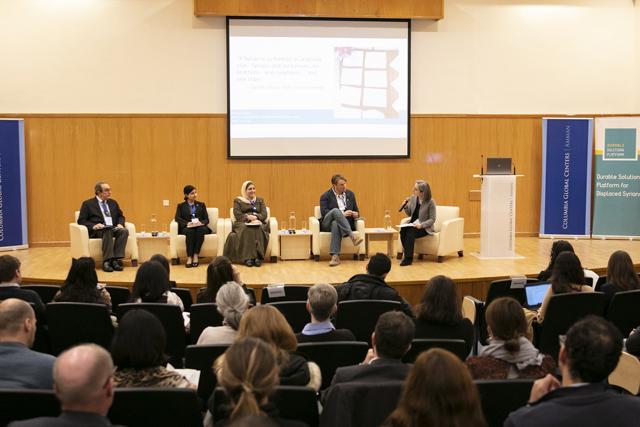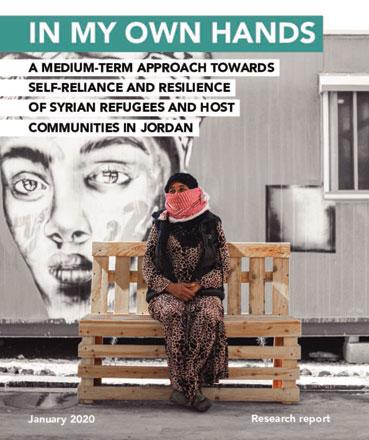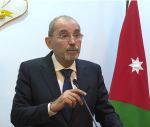You are here
Panel discussion explores modes of enhancing self-reliance of refugees, host communities
By Saeb Rawashdeh - Feb 08,2020 - Last updated at Feb 09,2020

Panelists discuss policies to alleviate economic problems of the Syrian refugees and host communities on Thursday at the Columbia Global Centres (Photo courtesy of the Columbia Global Centres)
AMMAN — In spite of finding itself in the eye of a regional storm, the Kingdom’s disposition moves it to welcome refugees displaced by nearby conflicts, said Senior Adviser to HRH Prince Hassan and Director General of the West Asia North Africa Forum Omar Rifai on Thursday.
Rifai made his remarks at the launch event for a report titled “A Medium-Term Approach towards Self-Reliance and Resilience of Syrian Refugees and Host Communities in Jordan” held at the Columbia Global Centres in Amman.
During the event, a panel of experts explored how international refugee assistance can best address the medium- and long-term needs of Syrian refugees and host communities in the Kingdom and foster self-reliance in a manner that promotes resilience and social cohesion.
According to organisers, the event aimed to convene and engage key stakeholders around a strategic dialogue on major policy issues of relevance to the self-reliance and resilience of displaced Syrians and vulnerable Jordanian communities.
Other goals were to produce quality research and data analysis on policy and programming solutions by placing a special focus on livelihoods, education and protection of Syrian refugees.
Durable Solutions Platform (DSP) Specialist Lana Stade said that the DSP, a regional initiative which seeks to acknowledge and convene a strategic dialogue and support programing solutions for displaced Syrian communities, has conducted multiple research projects on integrating refugees into host communities.
She highlighted a study that the DSP embarked on last year together with Columbia University to identify priorities in core issues in Jordan that are critical to ensure the dignity and placement of refugees for next four to five years.
Director of the Forced Migration and Health Programme and Associate Professor of Population and Family Health at Columbia University Monette Zard highlighted “the empathy and good-will” expressed towards refugees, adding that the Jordanian government is “transparent” about its international commitments and employs an entrepreneurial approach in the field of humanitarian aid.
Syrian refugees and vulnerable Jordanian communities face the same challenges — poverty, debt and unemployment — with much to build upon in terms of crafting strategies that can lift up both Jordanian communities and the refugee population, Zard said, stressing the importance of Jordan’s stable political climate as a base for serving these segments of society.
The event, put on by the DSP, the Programme on Forced Migration and Health at Columbia University and Columbia Global Centres-Amman, witnessed the attendance of local and international stakeholders, scholars and experts, according to the organisers.
Related Articles
AMMAN — Structural vulnerabilities, which are likelihoods of encountering major difficulties within a family atmosphere because of deficient
AMMAN — The Resilient Youth, Socially & Economically (RYSE) partnership, under the lead of the Danish Refugee Council (DRC), on Wednesda
AMMAN — The Jordan Civil Society Network for Displacement (JCSND) announced a pledge under the UN Global Refugee Forum 2023 to leverage the

















